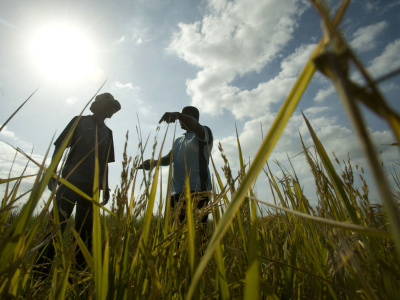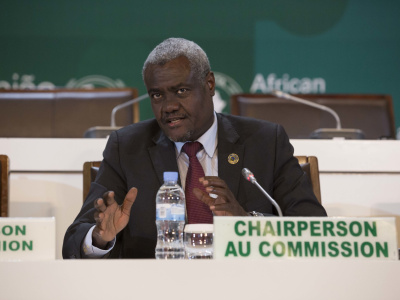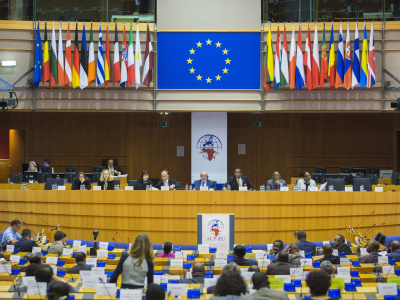
‘Africa rising’ means taking ownership of its knowledge production
African think tanks must move more proactively into the Africa-EU policy analysis and advice realm by exploiting the potential to collaborate with existing EU-Africa research networks. At the same time, African governments should also contribute to ‘growing their own’ by recognising the role that African think tanks can play in evidence-based research around this important strategic partnership.
Heralded as a partnership of equals when the EU-Africa partnership was launched in 2007, the aspiration did not mask the many asymmetries in the relationship – from actual human and financial resources to the challenges of coordination between a partially supra-national entity (the European Union – EU) and a purely intergovernmental one (the African Union – AU). Nevertheless, Europe remains a significant external partner. The European Union after all is the continent’s biggest partner in development (EU-28 and bilateral), and a significant trader and investor. Equally important is its contribution to Africa’s peace and security architecture.
While some of the EU’s members have colonial baggage, the EU is a much more complex institution that defies labelling as an imperialist or colonial power. It’s an important global soft power with a significant multilateral role. And while Africans and Europeans don’t always agree, both are convinced of the imperative of multilateralism as the route to a rules-based system rather than one determined purely by the power of the strongest. Africa and Europe are also neighbours, and the migration crisis has brought home, perhaps in the starkest possible terms, that industrialised Europe cannot be an island of prosperity in a (southern) sea of poverty and instability. Nor can its Member States act with impunity in Libya (and elsewhere), and expect no political and economic consequences for their own territory. There are both value and interest-based reasons for African think tanks to spend more time on in-depth policy research and engagement on Africa-Europe themes.
Changing who determines the debate
Europe has a sizeable research ‘industry’ that focuses on African issues and the relationship between the two continent. Historically, much of this has been driven by the development dimension of the engagement, but more recently, the underlying driver has become security (countering violent extremism) and migration. These are negative drivers of interest in Africa, and force the Europe-Africa debate into a narrow silo that regards Africa as a threat and source of instability – it’s about protecting the ‘empire’ from the ‘Huns’, amplified by the populist and xenophobic surge in Europe. It also stands in marked contrast to the manner in which China continues to articulate its engagement with Africa and the opportunities the continent presents. While China is the next global superpower and African states cannot and should not ignore it, the EU’s rules-based approach to global issues and its soft power make it an important potential ally and partner on many terrains.
For a combination of reasons, African think tanks are not doing as much research or policy engagement as they should on a region that is both close and diplomatically and politically significant.
They cannot rival in resources those of their counterparts in Europe. More importantly, they are not often acknowledged enough by their own governments as potential knowledge banks. They battle for limited financial resources and where these come from external parties, think tanks may be castigated for being agents of imperialism or other forces conspiring against the state. These factors reinforce each other in a mutually vicious cycle, resulting in African think tanks playing a much more limited role in the policy debates on this and other issues. Ironically, while there are many debates and conferences on Africa-EU in Europe, there are far fewer in Africa where Africans themselves have initiated and funded the conversation.
As the EU-Africa partnership enters its second decade, Africans (governments, businesses, civil society and academics) need to scale up the tools available to engage in a partnership of equals. For all the talk about a post-truth world, independent knowledge and analysis remain imperatives for effective decision-making and policy making in Africa. In fact, they are more important now than ever. The continent boasts many credible and quality think tanks. Over the years they have grown in number and quality and are cultivating networks across the continent. Some of these activities have been spurred by support from external donors, and yet they have developed a momentum of their own.
African think tanks must become the knowledge producers for African states and the AU as these navigate global uncertainty – from Brexit and Cotonou to the Economic Partnership Agreements in a world where WTO is being undermined, and migration becomes the fixation of the age.
Bolstering impact: independence and evidence-based research
So how do we strengthen African think tanks in the area of EU-Africa research and policy engagement?
Over the last few years, African think tanks have sought to cooperate and exchange views not only on the major issues of the day, but also on the business of think tanks. Both are important if the continent’s think tanks are to strengthen their input into policy at the continental and global level, as the research paradigm should not be that when Europe and Africa meet they should talk about development and war on the continent. What happens elsewhere in the world may be equally impactful for Africa-EU relations.
Thus, more effective linkages between African think tanks and the Africa-EU policy world would require a number of elements.
First and foremost, African think tanks need to be recognised as resources by their own governments and social actors. This means recognising the importance of analytical independence and providing instruments to allocate financial resources to ‘growing our own’, rather than relying on external consultants and analysts. It cannot be achieved overnight and it requires think tanks to constantly seek engagement; regular dialogue changes perceptions.
Second, think tank leaders need to place more emphasis on relations such as the EU-Africa one, which plays such an important role in the continent’s affairs. This should include allocating resources to considering and understanding better the dynamics at play in the European Commission and the Council, in the same way that European think tanks analyse and delve into the institutions of the AU. African think tanks should also place a much higher premium on better global understanding rather than only on engaging at the African level. The ongoing challenge is having discretionary funds for such work even in the absence of support from African governments and institutions.
As think tank leaders, we are often caught up in a vortex of proposal writing, project execution and financial constraints, but we cannot abandon our role to think about critical dimensions of Africa’s development and stability, undertake evidence-based research and engage with African and European policymakers on our work.
There is much quality policy work on the continent and African think tanks must work together in creating platforms that better profile their work in global media. Pooling communications resources can help to optimise limited dissemination instruments, although the ‘democratisation’ of the social media space has created many opportunities even for small think tanks to bring their work to the world. Here, initiatives such as the Africa Portal initiative of the South African Institute of International Affairs (SAIIA) and the Centre for International Governance Innovation (CIGI) – a one-stop shop for African produced research – are worth leveraging in the EU-Africa debate.
Furthermore, to maximise the impact, African think tanks should explore ways to cooperate among themselves on policy research well in advance of major policy windows, such as the Africa-EU summit.
In this regard, existing research networks can also be leveraged more strategically. The annual African Think Tank Summit could become a regular platform for debating and communicating policy insights on Africa’s key challenges as well as important external relationships. In addition, such gatherings should also be seen as the opportunities to reflect not only on African themes, but broader global challenges.
Early in the EU-Africa partnership, the Europe-Africa Research Network (EARN) was established with the aim of bringing together think tanks from both continents to undertake work on this very important relationship. Yet, it failed to build a deep network of collaboration. In-depth research requires financial resources and African think tanks in particular were hamstrung in the type of commitments they could make within the existing means. This compounded the asymmetry that characterised many dimensions of the partnership. Nevertheless, initiatives such as EARN are vital in building up effective policy engagement by African think tanks. As the strategic partnership enters the next decade, African think tanks should explore the ways to overcome constraints to make this a reality.


About the author
Elizabeth Sidiropoulos is the Chief Executive of the South African Institute of International Affairs, (SAAIA) Johannesburg
Read the full magazine issue








